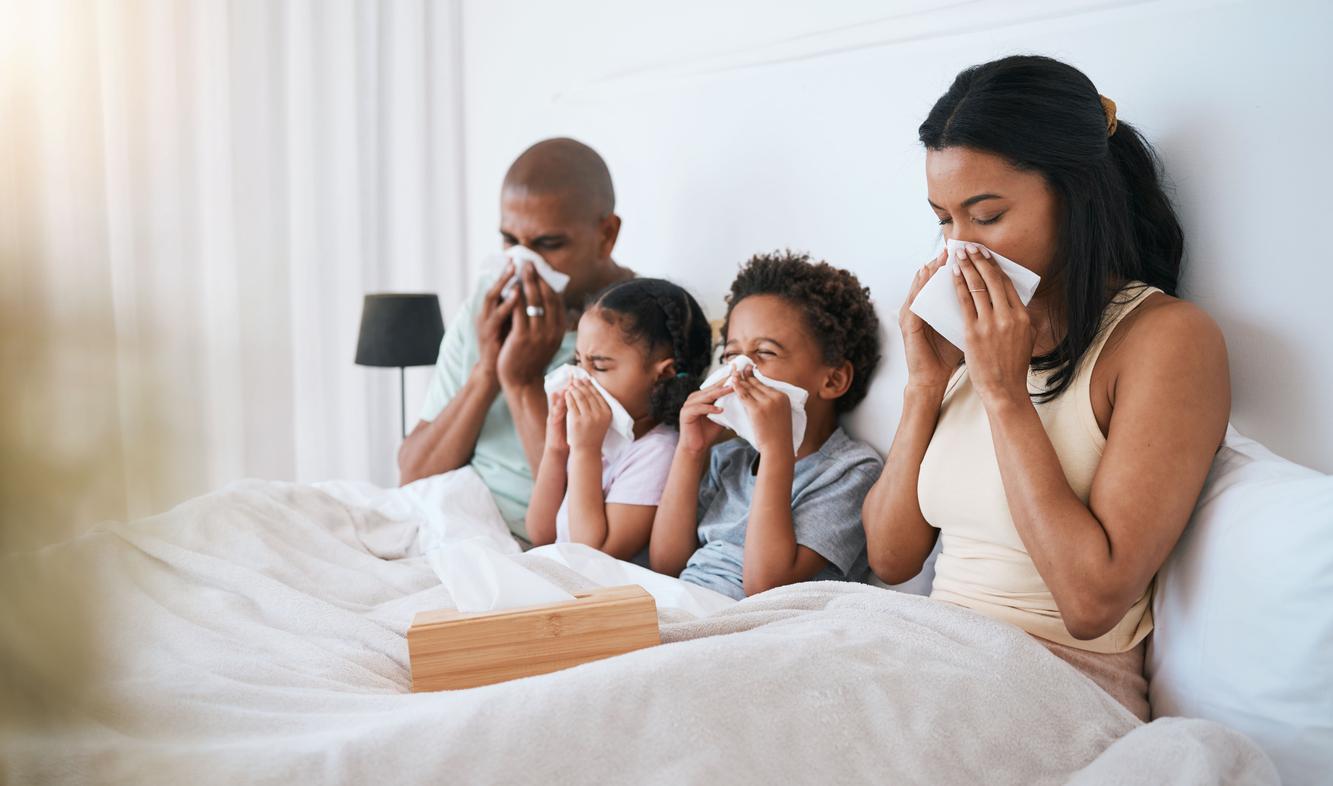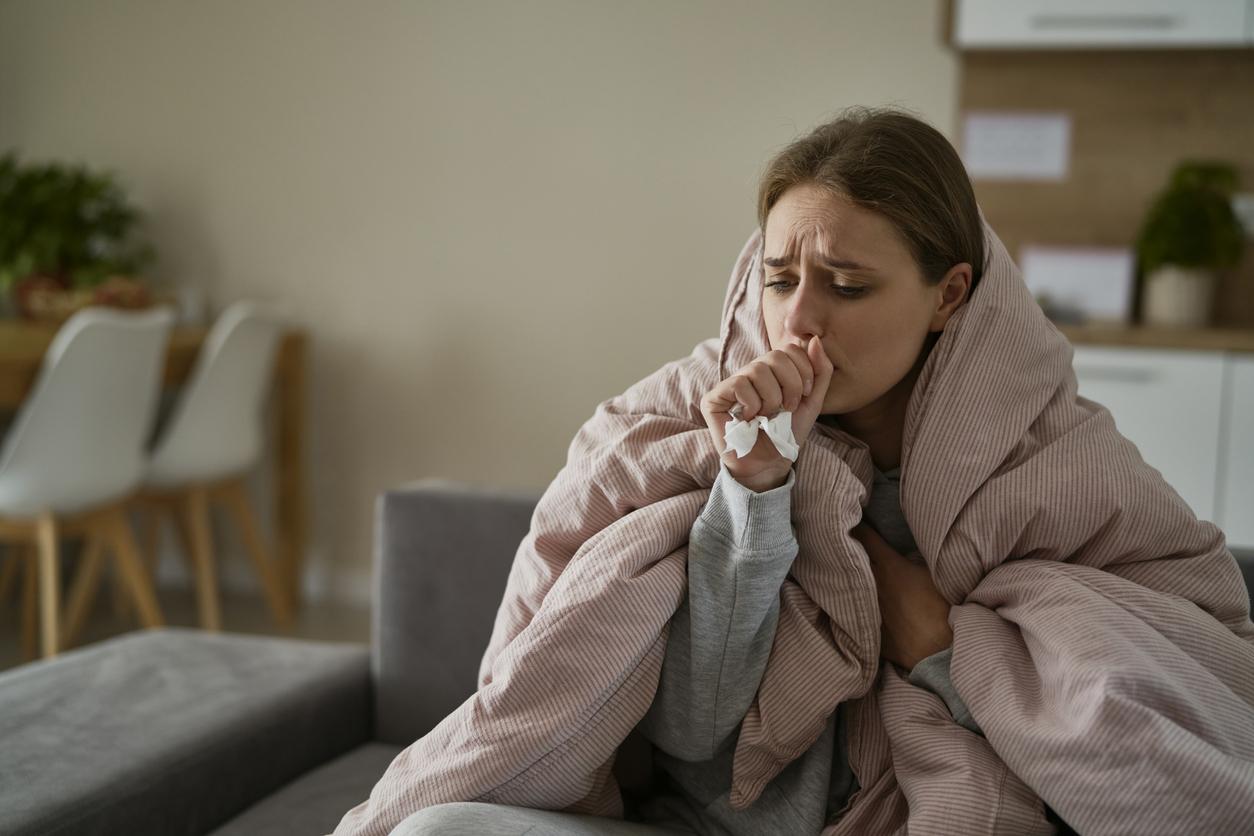The flu epidemic, exceptionally early in December 2022, now affects all regions and the virus is circulating quickly, according to the latest bulletin from Public Health France (December 16). At the same time, the Covid epidemic has started to rise again, in a context of relaxation of barrier gestures, and while wearing a mask is no longer compulsory.
The SARS-CoV-2 coronavirus (which is responsible for Covid-19) and the influenza virus (which causes the flu) have many points in common: they are so-called “RNA” respiratory viruses, which means that they have need the cellular machinery of the cell they infect to reproduce. They are able (during replication) to mutate, that is to say to change.
Moreover, these two respiratory viruses are transmitted in the same way: via droplets of saliva (projected when speaking, coughing, sneezing, etc.) and via physical contact (when the kiss, when we shake hands…).
Symptoms: how do I know if I have the flu or Covid-19?
Unfortunately, “it is often difficult to tell the difference between a Covid-19 and the flu on the simple observation of the symptoms, even when you are a doctor” recognizes Dr. Philippe Laurent, pulmonologist.
In case of Covid-19 or fluwe can thus observe fever (with a body temperature above 38°C), respiratory signs (a dry or oily cough, shortness of breath…), significant fatigue (we speak of asthenia) and/or body aches (myalgia).
To know. “Statistically, in the event of Covid-19, we rather see the fever appear before the cough; for the flu, it’s the opposite. But that’s still theory“says the pulmonologist. Moreover, the Covid-19 like the flu can be more or less symptomatic …
However, there are signs that may suggest Covid-19 rather than the flu: these include digestive signs (diarrhea, for example), sometimes intense headaches (headaches) and loss of taste and/or smell (ageusia/anosmia) or even odynophagia in the case of the Omicron variant.
Flu or Covid-19: when should you consult?
In the event of symptoms that are reminiscent of flu or Covid-19 (fever, cough, severe fatigue, etc.), the best thing is to do a PCR or antigen test.
“For young adults and children, it is important to know if you have Covid-19 in order to apply the necessary isolation measures and warn contact persons.“
“Differentiating between Covid-19 and influenza is crucial in patients who are at risk of developing a severe form in the event of infection with the SARS-CoV-2 coronavirus: renal or respiratory failure, chronically ill patients, patients treated with chemotherapy, hospitalized patients, nursing home residents…“says the doctor. Also, if you have symptoms that may suggest flu or Covid-19, don’t wait to call your doctor !
Flu or Covid-19: what about vaccines?
“The flu vaccine is effective, but only about 65% effective, provided you get vaccinated again every year: it is therefore not an insurmountable bulwark against the flu“explains Dr. Philippe Laurent.
Same thing for vaccines against Covid-19: “if these vaccines are very effective (generally more than 90%), they only protect against infection up to about 50%. They have been designed to significantly reduce the risk of a severe form of Covid-19“. It is nevertheless still possible (and highly recommended) to carry out a Covid reminder because it is adapted to the Omicron variant, and therefore more effective. Find out more in our article Covid vaccination (reminder): how long? for whom?
Whether you have been vaccinated against the flu and / or against Covid-19, it is always possible to catch these diseases… “Although it is always possible to catch the flu or Covid-19 despite vaccines, those for whom it is recommended should not miss getting vaccinated because they massively protect against an evolution towards forms which can be fatal or leave serious sequelae“says the doctor.
The right gestures in case of a cold
Colds: what to do
- The bad news is that no medication whatsoever will reduce the duration of the common cold. Whether treated or not, it lasts on average between 7 and 10 days. To fight against this winter infection, it is above all necessary to help the organism to fight against the virus by full of vitamin C. Either with a supplement (500 mg per day), or by consuming citrus fruits, kiwis or cabbage.
- It’s time to test thyme herbal tea : make a ballotin with sprigs of fresh thyme and leave to infuse in boiling water for about 3 minutes. Remove the ballotin of thyme, add a teaspoon of honey and drink when hot.
- During the common cold, it is also important to wash your nose with a saline solution. These sprays clean the mucous membrane and purify the inspired air before it reaches the lungs.
What you should not do
- It is useless to fight the fever with paracetamol if it does not exceed 38.5°. Indeed, this small rise in temperature is natural and allows your body to fight against infection.
- On the other hand, hydrate yourself more than usual (thyme tea, again and again!)
- THE decongestant medications which unclog the nose should be used with caution, asking the pharmacist for advice on the contraindications. Some are to be avoided in case of cardiovascular disorders and others in case of urinary disorders. In addition, they often have a rebound effect: they work well the first time but with each use, the dose must be increased to obtain the decongestant effect.
The right things to do in case of the flu
What to do
- First of all, the fever must be lowered. Stay warm, hydrate and take paracetamol: 1 to 2 doses of 500 mg per dose, to be renewed if necessary after 4 hours minimum, without exceeding 3 g per day.
- To be effective, antiviral drugs (such as Tamiflu) must be taken within 48 hours of the onset of the flu. Since these drugs can only be obtained by prescription, do not delay in calling the doctor. This treatment is not a miracle drug but it can reduce the intensity of symptoms, speed up recovery and reduce the risk of complications like bronchitis or sinusitis.
What you should not do
Insist with the doctor to obtain a prescription of antibiotics, Of course. Need we remind you again: antibiotics target bacteria and not viruses. And they won’t be able to cure your cough or speed up your recovery.
Thanks to Dr. Philippe Laurent, pulmonologist at the Aressy clinic (Pyrénées-Atlantiques – ELSAN group).


















